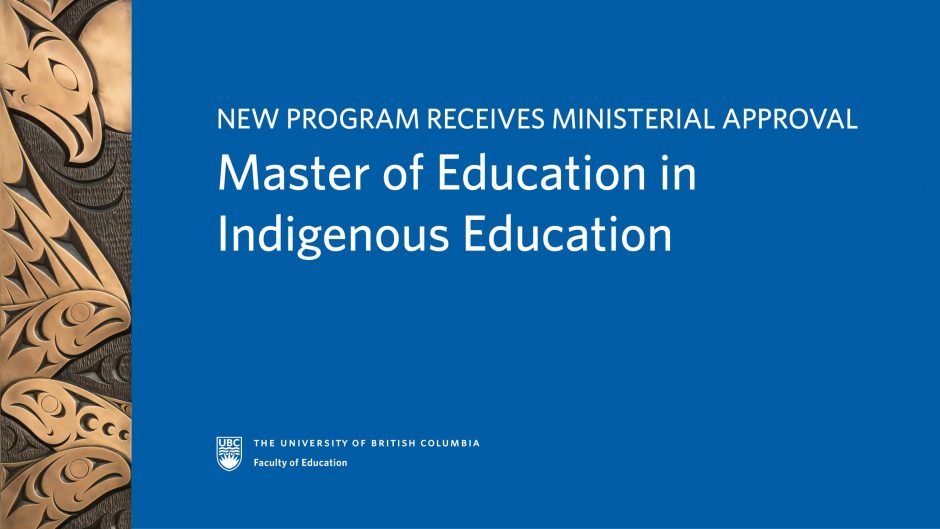
Image: ʔəlqsən (hən̓q̓əmin̓əm̓ word for ‘point of land’) art installation: yə́χʷəleʔ (eagle) panel with sce:ɬtən (salmon) and sθəqəy̓ (sockeye) | Artist: Brent Sparrow, Musqueam | UBC Vancouver
UBC Faculty of Education will be home to British Columbia’s first Master of Education in Indigenous Education, after receiving approval from the Ministry of Advanced Education and Skills Training.
To offer a new degree program, public post-secondary institutions in British Columbia must apply to the Ministry in accordance with the Degree Program Review Criteria and Guidelines established by the Minister of Advanced Education and Skills Training. Each application is posted for peer and public review for 30 days and assessed as to whether it meets criteria related to the institution’s mandate and strategic plan, system consultation and coordination, labour market need and student demand.
“We’re committed to reconciliation and advancing systemic change so that post-secondary education and training is respectful, relevant, responsive, and receptive to Indigenous learners, institutes and communities. UBC’s new Master of Education in Indigenous Education will provide culturally responsive education for Indigenous learners, help deepen non-Indigenous learners’ understanding of Indigenous culture, and build the capacity of Indigenous schools, institutes and communities, helping to advance that deep commitment to reconciliation through education,” Honourable Anne Kang, Minister of Advanced Education and Skills Training said.
The program will help fulfill some of the important goals and actions set out in UBC’s strategic plan, Shaping UBC’s Next Century, the Faculty’s strategic plan, Learning Transformed, and UBC’s Indigenous Strategic Plan, which provide the framework for Faculty and unit-level commitments that form UBC’s response to the Calls to Action released with the Truth and Reconciliation Commission of Canada’s Final Report.
Recognizing the need for transformative change in Indigenous education, the program will:
- Increase access to graduate education for Indigenous learners, while building educational capacity for Indigenous schools and communities
- Enhance partnerships with Indigenous communities and offer Indigenous worldviews as Indigenous scholars and local Elders will be invited to partner with instructors
- Provide educators with Indigenous knowledge they can bring to educational settings
- Advance the Office of the Auditor General of British Columbia’s report on Indigenous education which recommends more policy and curriculum leadership from the Ministry of Education
- Support the British Columbia Teachers’ Council 9th professional standard for educators to contribute to truth, reconciliation and healing, and foster a deeper understanding of Indigenous ways of knowing and being, histories, and cultures
“I’m delighted that this new degree program — the first of its kind in BC— has obtained Ministerial approval, in recognition of the Faculty of Education’s reputation as a leader in Indigenous education. The addition of this unique program conveys our commitment, as a university, to reconciliation and aims to contribute to improved educational outcomes for Indigenous students across BC.” – Dr. Andrew Szeri, VP Academic and Provost, University of British Columbia, said.
The program will be designed for educators, educational administrators and leaders, Indigenous community members, and other professionals in education settings who want in-depth preparation on K-12 Indigenous educational frameworks, theories, policies, curricular approaches, and community relationships that build upon Indigenous knowledge systems. It will also support educators implementing the revised provincial K-12 curriculum, emphasizing Indigenous worldviews, histories, and pedagogies through the First Peoples Principles of Learning (FPPL). Course enrollees will be offered opportunities through course goals, objectives, activities, content, and assessment to learn how Indigenous knowledges can be incorporated into practice.
“Largely taught by Indigenous scholars, this program will provide leadership opportunities for Indigenous educators, as well as schools and districts. It will create pathways to graduate education for Indigenous and ally educators, and build their knowledge and capacity to respond to changing policy demands,” Dr. Jan Hare, Dean pro tem, Faculty of Education, University of British Columbia, said.
Offered as a blended learning model, the program will begin with week-long in-person summer institutes, followed by online courses during the academic year. The hybrid coursework will accommodate full-time educators (offered on a part-time basis, with required courses offered on weekends), increase access to graduate studies for Indigenous learners from communities beyond the lower mainland of British Columbia, and reduce the amount of time Indigenous learners will have to leave their communities to complete their graduate studies. Additionally, the summer institutes will focus on land and place-based learning, offering intensive experiential lessons which learners can link to the curriculum in British Columbia.
Offered as a cohort model, the program will be delivered cooperatively by the Faculty’s Department of Language and Literacy Education, Department of Educational Studies, and Department of Curriculum and Pedagogy. Leadership and administrative support will be provided by the Faculty’s Office of Indigenous Education.